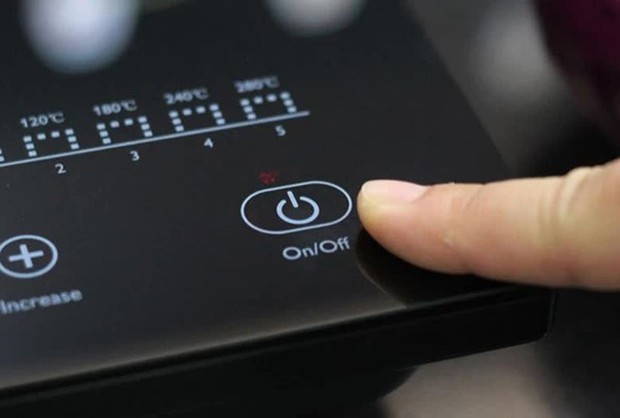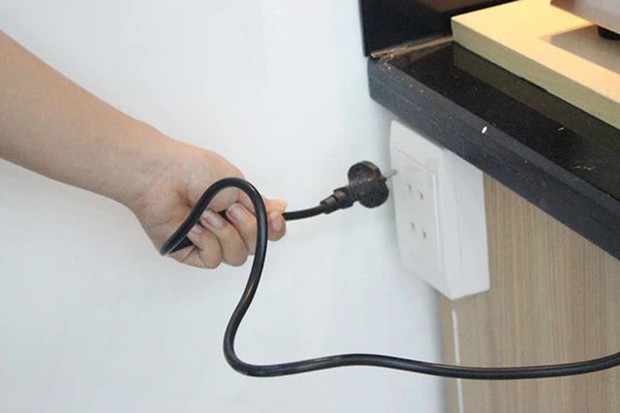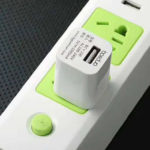In today’s modern family life, it can be said that the presence of household electrical appliances is indispensable. These devices support and save time and effort in household chores. However, during use, some of them can cause trouble or accidents. The following case is an example.
According to a social media account on a forum, a family’s induction cooktop suddenly exploded while the person was using it. Fortunately, only the device was damaged, and there were no injuries.

The family’s induction cooktop exploded, causing the glass top to shatter (Photo: Hanh Karate)
In reality, induction cooktop explosions or fires during use are not uncommon. According to the owner’s sharing, this cooktop was newly purchased and used for only three months. In 2019, a user from Ninh Binh also shared that their induction cooktop exploded after only four days of use.
The cooktop malfunctioned and shattered while cooking. Fortunately, there was no one near the cooktop at the time, so there were no injuries. “I was boiling water for cooking when I heard a loud bang. When I ran to check, I saw the water splashing everywhere, and the cooktop had cracked, exposing the internal components,” the user recounted.
According to experienced experts in the household appliance industry, accidents with induction cooktops, electric stoves, and infrared cooktops during use can be caused by various reasons. Most of these reasons are related to users’ daily habits and the origin and quality of the appliances.

Induction cooktop explosions are not rare in reality (Photo: Illustration)
Causes of Induction Cooktop Fires and Explosions
1. Overloading the Cooktop
The first and most common cause is the induction cooktop being constantly overloaded for long periods. Overloading here refers to the cooktop operating continuously at high power without rest for heat dissipation. As a result, the overall temperature of the cooktop, especially the cooking area, remains high.
Over time, this high temperature can lead to cooktop explosions. If an immediate explosion does not occur, the cooktop’s lifespan and efficiency will be significantly reduced. Therefore, families should avoid keeping their induction cooktops continuously operating at high temperatures for extended periods. After about 30-60 minutes of operation, it’s recommended to turn off the cooktop for around 5-10 minutes to allow it to cool down and dissipate heat.

Induction cooktops need some rest time to dissipate heat (Photo: Illustration)
2. Improper Placement of the Cooktop
The second cause is users placing the cooktop in an inappropriate location. This situation often occurs with standalone induction cooktops that are not installed flush with kitchen cabinets. Unsuitable locations can include being too close to walls, other electrical appliances, or sources of heat or water.
Placing the cooktop too close to a wall unintentionally obstructs the circulation and heat dissipation process. Consequently, experts recommend leaving a 5-10cm gap between the cooktop and the wall. When multiple heat-generating appliances are positioned closely together, the overall temperature rises significantly, posing a higher risk of fire and explosion. Water can also cause electrical short-circuits or damage the cooktop’s wiring.
Therefore, the ideal location for families using standalone induction cooktops is on a flat, well-ventilated, and dry surface. In this way, the cooktop operates efficiently and safely.

Standalone induction cooktops should be placed in well-ventilated and dry areas with space around them for heat dissipation (Photo: Illustration)
3. Incorrect Use of Cooktop Controls
Modern induction cooktops are typically controlled and adjusted using electronic buttons directly on the surface. However, using these buttons incorrectly also poses a high risk of the cooktop exploding or experiencing an electrical malfunction.
Specifically, according to experts, users should avoid continuously pressing or changing the settings, modes, or temperatures of the cooktop. Doing so can cause the control circuit to become disordered, resulting in overloading and dangerous electrical malfunctions.

Illustration
4. Unplugging the Cooktop Immediately After Cooking
Another common incorrect habit that can lead to cooktop explosions is unplugging the cooktop immediately after cooking. When the cooktop finishes its operating cycle, it’s still hot, and some internal components are still running.
Suddenly unplugging the cooktop can abruptly stop the operation of these components, increasing the risk of explosion. Therefore, if it’s necessary to unplug the cooktop, it’s better to wait for about 10-15 minutes for it to cool down before doing so.

Illustration
In addition to these main causes related to user habits, experts also point out other objective causes, such as unstable household electric sources, cooktop wattage not compatible with household voltage, or appliances with pre-existing defects that were not repaired in time, etc.
When an induction cooktop experiences an explosion or electrical malfunction, regardless of the severity, it’s important for users to immediately stop using it. Then, contact technicians for inspection, repair, or replacement if necessary.
Source: Đời Sống Pháp Luật
1. Overloading the cooktop for extended periods without rest can cause a build-up of heat and lead to explosions.
2. Improper placement of the cooktop too close to walls, other appliances, or heat/water sources can obstruct heat dissipation and increase the risk of fire and explosion.
3. Incorrect use of cooktop controls, such as continuously pressing buttons or changing settings, can disorder the control circuit and result in dangerous electrical malfunctions.
4. Unplugging the cooktop immediately after cooking can abruptly stop the operation of internal components, increasing the risk of explosion.
Explore 12 Amazing Destinations for Biking Trips
Unlock Vietnam in a brand new way with an exciting biking tour! Discover the stunning beauty of the country with Dien May XANH’s top 12 must-see destinations. From sweeping plains to clear blue beaches and mountainous vistas – experience all the sights with your own personal cycling tour. Find your ideal route and set out for an adventure today!



































